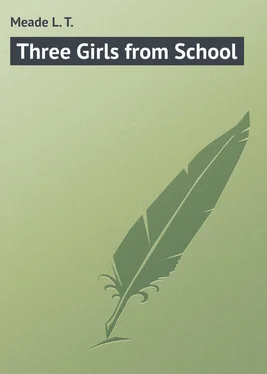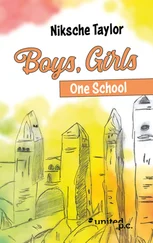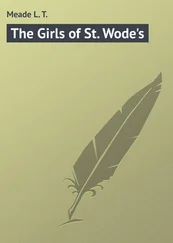L. Meade - Three Girls from School
Здесь есть возможность читать онлайн «L. Meade - Three Girls from School» — ознакомительный отрывок электронной книги совершенно бесплатно, а после прочтения отрывка купить полную версию. В некоторых случаях можно слушать аудио, скачать через торрент в формате fb2 и присутствует краткое содержание. Жанр: foreign_prose, foreign_children, на английском языке. Описание произведения, (предисловие) а так же отзывы посетителей доступны на портале библиотеки ЛибКат.
- Название:Three Girls from School
- Автор:
- Жанр:
- Год:неизвестен
- ISBN:нет данных
- Рейтинг книги:5 / 5. Голосов: 1
-
Избранное:Добавить в избранное
- Отзывы:
-
Ваша оценка:
- 100
- 1
- 2
- 3
- 4
- 5
Three Girls from School: краткое содержание, описание и аннотация
Предлагаем к чтению аннотацию, описание, краткое содержание или предисловие (зависит от того, что написал сам автор книги «Three Girls from School»). Если вы не нашли необходимую информацию о книге — напишите в комментариях, мы постараемся отыскать её.
Three Girls from School — читать онлайн ознакомительный отрывок
Ниже представлен текст книги, разбитый по страницам. Система сохранения места последней прочитанной страницы, позволяет с удобством читать онлайн бесплатно книгу «Three Girls from School», без необходимости каждый раз заново искать на чём Вы остановились. Поставьте закладку, и сможете в любой момент перейти на страницу, на которой закончили чтение.
Интервал:
Закладка:
By-and-by she reached the suburbs, turned down a side street, and knocked loudly at a little green door. The door was opened by a woman who was evidently at once the owner of the house and her own servant.
“How do you do, Miss Brooke?” she said, looking at Annie in some astonishment. “I am very sorry indeed, miss, but Susie has been having her bad days, and your dresses are not ready for you. She’ll send them down this evening, if possible; but when her back aches at its worst she cannot manage the machine, miss; so I do hope, Miss Brooke, that you won’t be hard on her.”
“Not at all; I am very sorry for her,” said Annie in her gentle voice. “May I go in and talk to her for a few minutes, Mrs Martin?”
“To be sure, miss; you will find her upstairs in the sewing-room.”
Annie seemed to know her way quite well about this house. She ran up some very steep stairs and entered a low room which had at the end a sloping roof. There was a bed tucked as it were out of sight under the eaves; but right in the fall blaze of the summer sun, and where the room was most stiflingly hot, sat a very pallid girl with a large, over hanging brow, pale, tired-looking eyes, and a sensitive mouth.
The girl was bending over a large sewing-machine, the work of which she was guiding with her hand, while her feet worked the treadles. The moment she saw Annie she looked at her with a great rush of colour spreading over her face.
“Why, Miss Brooke!” she said.
“Ah,” said Annie, “you are behaving very badly indeed to me, Susie. I have just seen your mother, and she says that your back is so bad you can’t do your machining, and in consequence my work — mine , Susan – is not finished. Oh Susan! it is somebody else’s dress you are making now, and you are quite well enough to do your machining. I am surprised.”
“It is true what mother said, all the same, miss,” replied the girl, interrupting her words as she spoke with a great and exhausting fit of coughing. “I ain’t fit for no work, and this room is that stifling with the sun pouring in and no means of opening more than that little crack of the window. I haven’t done your work, miss, for I knew you ’ud be kind, and Mrs Hodge at the mill is so cross if I don’t carry out her least wish. But I meant – I did indeed, miss – to go on with your things this afternoon. I did most truly, miss, for it’s a real pleasure to work for you, Miss Brooke.”
“Never mind my things to-day,” said Annie; “you’re not fit, and that is the simple truth. You ought to go downstairs, Susan, and get your mother to take you into the park; that is what you want.”
“I may want it, miss,” said Susan, “but I won’t get it, for mother have her hands full with the parlour lodger and the drawing-room lodger. Much time she do have for walking out with me as though I were a fine lady.”
“Poor Susie!” said Annie; “and you so clever, too.”
“Ah, miss, nothing frets mother like me thinking myself clever. She says that all I want is to know the three R’s – reading, writing, and ’rithmetic – that’s how she calls ’em. She hates my books, miss; and as to my thoughts – oh, dear Miss Brooke! you are the only one in all the world as knows about them.”
“And I want to help you,” said Annie. “I have come here all the way this morning to ask you to lend me that manuscript book of yours. I mean to show your lovely poems to a great, clever, and learned man, and if by chance he should publish any of them, you would be famous, Susan, and you need never do this horrible grinding work any more.”
“Oh, miss,” said the poor girl, “you don’t say so!”
“I do say so, Susie; and I suppose I ought to know. Give me the book, dear, at once; don’t keep me, for I haven’t a minute. These are school hours, and I had to pretend I had a headache in order to get away to see you. You must let me manage about your poetry, Susie; and of course you will never tell.”
“Why, miss, is it likely?”
“Well, fetch the book, then.”
Susie crossed the room, went on her knees before an old chest of drawers, and with the colour now high in her wasted cheeks and her light eyes darker with emotion, she presented the treasured book to Annie.
“There is my last bit, miss; you will find it at the end. It’s ‘Thoughts on the Sunset’ I was thinking them in reference to my own early death, miss, and they’re very affecting indeed. Perhaps you will show them the first, miss, for they seem to me the very best I have done.”
Susie looked with a world of pathos at Annie. Her eyes said as plainly as eyes could speak, “Oh! do read the poem before you go, and tell me what you think of it.” Annie read the message in the eyes, but had not an idea of acceding to poor Susie’s wish.
“You will have your book back in a few days,” she said, “and I do hope I’ll have good news for you; and here is half-a-crown, and you needn’t hurry about my things. Good-bye, Susie. Do go into the park if you can.”
Susan nodded. She felt so grateful to Annie, and so excited, that she could not speak. With the book tucked under her arm, Annie flew downstairs.
She was much annoyed at being intercepted in the passage by Mrs Martin.
“I do ’ope, miss,” said that poor woman, “that you ain’t been ’ard on my girl. She does do her very best; for, what with the unpickin’ of your old dresses, and what with tryin’ to turn ’em into new ones, it don’t seem as though it were worth while. You pays her very little, miss; and what with never givin’ her anythin’ new, it don’t seem worth the trouble, that it don’t.”
“Oh! I am so sorry,” said Annie, who in her moment of victory was inclined to be kind to any one; “but, you see, I take an interest in Susan for other matters. She is not well, and she wants rest. I am so glad to have some one to alter my old things, and if I did not give the work to Susan, I should have to employ a girl I know at home. But I will try – I really will – to give her some new plain cotton dresses to make for me later on. In the meantime, Mrs Martin, I have been recommending her to go for a walk in the park. She has great talent, and her life ought not to be sacrificed.”
“There, miss!” said Mrs Martin, putting her arms akimbo and looking with great dissatisfaction at Annie. “It’s you as encourages her in scribblin’ of that poetic stuff. Never did I hear such rubbish in all my born days. If it wasn’t for you, miss, she would burn all the stuff instead of sittin’ up a-composin’ of it. What with sunsets, and deathbeds, and heartaches, and green grass, and other nonsense, I don’t know where I be when I listen to her words; I don’t really. I see you’ve got the book under your arm now, miss; and I do wish you’d burn it – that I do!”
“It would hurt her very much indeed if I did,” said Annie; for a further thought had darted through her brain at Mrs Martin’s words. Here would be an easy way to hide her own deed for ever and ever. If Mrs Martin sanctioned the burning of her daughter’s book, surely Annie’s wicked scheme would be concealed for ever.
“I agree with you,” said Annie, “that it is bad for poor Susan to write so much poetry. Her heart is set on it, I know; still, if you disapprove – ”
“That I do, miss; I wish you’d give me the book now, and I’ll keep it under lock and key.”
“No, no,” said Annie eagerly. “Don’t do that on any account whatever. I have thought of a much better plan. She has lent me the book, for I promised to read her poems, poor girl! and to talk them over with a friend of mine. I need not give them back to her for the present.”
“Oh, miss! I’d be that grateful if you’d keep them altogether.”
Читать дальшеИнтервал:
Закладка:
Похожие книги на «Three Girls from School»
Представляем Вашему вниманию похожие книги на «Three Girls from School» списком для выбора. Мы отобрали схожую по названию и смыслу литературу в надежде предоставить читателям больше вариантов отыскать новые, интересные, ещё непрочитанные произведения.
Обсуждение, отзывы о книге «Three Girls from School» и просто собственные мнения читателей. Оставьте ваши комментарии, напишите, что Вы думаете о произведении, его смысле или главных героях. Укажите что конкретно понравилось, а что нет, и почему Вы так считаете.












